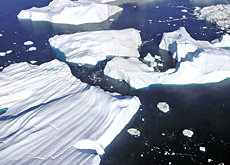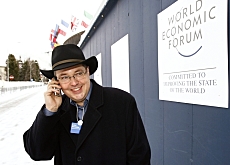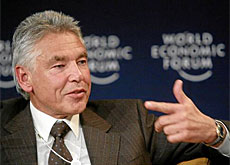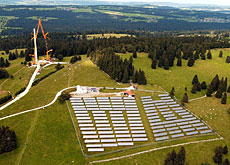UN panel issues tough climate change verdict

A report by a United Nations climate change body has issued its strongest warning yet that global warming is here, worsening and "very likely" caused by humans.
Over 500 scientists and government officials in the Intergovernmental Panel on Climate Change (IPCC), including a Swiss delegation, met in Paris to review the report, which came out on Friday.
The much-awaited document adds to growing calls for action to tackle global warming and could influence government and business policy worldwide.
It is the first part of the fourth such report to be issued since 1990.
“The aim is to provide governments with an understandable text without undermining its scientific integrity,” José Romero, climate expert from the Federal Environment Office, told swissinfo.
What will be done with the report now lies in the hands of politicians around the world. “The IPCC provides authoritative information and based on that policymakers have to decide how to meet the challenge of climate change,” added Romero.
Two other sections, on the impact of climate change and measures to tackle the issue, will be published in April and May, respectively.
Scientific progress
“Since [the previous 2001 report], there has been considerable scientific progress in detecting global warming and attributing the causes to human activity,” he said.
“The new IPCC report states that the climate is warming up and [the process] is accelerating. Over the past ten years, CO2 concentrations in the atmosphere and temperatures have increased much faster than in the past,” added Romero.
The report says that CO2 concentrations could double to 550 parts per million compared with pre-industrial levels.
It adds it is “very likely” – which means at least 90 per cent certain – that climate change is caused by humans burning fossil fuels, and projects temperatures rising by 2 to 4.5 degrees Celsius above pre-industrial levels by 2100, with a “best estimate” of a rise of three degrees.
The previous 2001 report said the link to humans was “likely”, or a 66 per cent probability. Growing certainty may put pressure on governments to do more to slow warming that could bring more floods, droughts, heatwaves and rising sea levels.
Since it was founded in 1988, the IPCC has been a meeting point between the world of research and decision-makers. And its reports are recognised by 192 UN member states.
“Exemplary organisation”
“It’s an exemplary organisation with no equivalent. It can mobilise scientists from around the world, a bit like a militia,” explained Romero. “The aim is to have the best researchers and a panel that represents every region of the world.”
The panel’s government-funded budget varies from year to year, depending on the work it carries out.
Switzerland, which is home to the panel’s secretariat and which hosts numerous IPCC member meetings, contributes SFr120,000-SFr150,000 ($96,650-$120,800) annually to its SFr5-million budget.
“Switzerland therefore benefits quite well from this network,” notes Romero.
Among the 553 authors of the report, 23 are Swiss, including five of the main writers and two of the coordinators: Thomas Stocker from Bern University and Andreas Fischlin from Zurich’s Federal Institute of Technology.
swissinfo
The Intergovernmental Panel on Climate Change (IPCC) was established in 1988 by two UN organizations, the World Meteorological Organization (WMO) and the United Nations Environment Programme (UNEP) to assess the “risk of human-induced climate change”.
The Panel is open to all members of the WMO and UNEP.
IPCC reports are widely cited in almost any debate related to climate change.
National and international responses to climate change generally regard the UN climate panel as authoritative.

In compliance with the JTI standards
More: SWI swissinfo.ch certified by the Journalism Trust Initiative



You can find an overview of ongoing debates with our journalists here. Please join us!
If you want to start a conversation about a topic raised in this article or want to report factual errors, email us at english@swissinfo.ch.